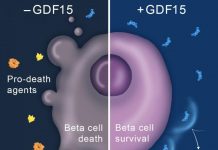February 2004 - Researchers at the University of Minnesota's Diabetes Institute for Immunology and Transplantation (DIIT) and the University of California San Francisco (UCSF) Diabetes Center have achieved insulin independence in four of six patients with long-term Type 1 diabetes using one infusion of insulin-producing "islet" cells from a single donor pancreas.
Individuals in whom Type 1 diabetes was complicated by hypoglycemic unawareness participated in this trial. The combination of improved islet preparation techniques and optimized recipient immunosuppression contributed to the successful study outcome. Insulin independence has now been maintained for more than one year in four recipients, for more than two years in three recipients, and for more than three years in two recipients. The study, funded primarily by the Juvenile Diabetes Research Foundation, is published in the March issue of the American Journal of Transplantation.
"This success builds upon other recent successes in islet transplantation and marks a critical step in developing islet transplants into a vital treatment option for people with Type 1 diabetes", said Dr. Bernhard Hering, associate professor of surgery, holder of the Eunice L. Dwan Diabetes Research Chair at the University of Minnesota, and principal investigator of the study.
"This trial also brings us a step closer to minimizing the requirements for immunosuppression in islet transplant recipients," said Dr. Jeffrey Bluestone, professor of medicine and director of the Diabetes Center at UCSF, and co-principal investigator of the study.
Dr. Bluestone developed the new generation anti-CD3 monoclonal antibody that was administered in this trial during the first two weeks after transplant. This antibody is directed against the subset of white blood cells that cause Type 1 diabetes and mediate rejection of transplants. Study participants received two other immunosuppression drugs.
Continue Reading Below ↓↓↓
In a subsequent trial supported by the NIH Immune Tolerance Network (www.immunetolerance.org), the research team at the University of Minnesota and UCSF will test whether maintenance immunosuppressive medication can be minimized or even discontinued in islet transplant recipients given the anti-CD3 antibody.
"The demonstration in this pilot clinical trial that insulin independence can be induced in Type 1 diabetes with single donor islet transplants is quite important because it will allow an increased number of islet transplants to be performed, and at the same time, will decrease the risk and cost of the procedure", Richard Insel, M.D., executive vice president of research at the Juvenile Diabetes Research Foundation.
Source: University of Minnesota









